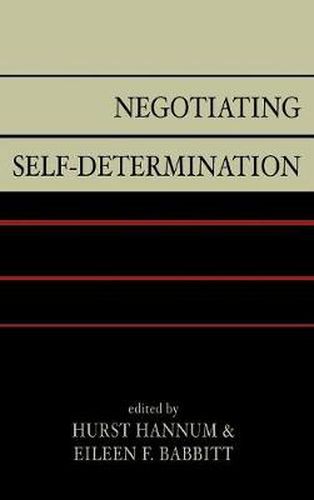Readings Newsletter
Become a Readings Member to make your shopping experience even easier.
Sign in or sign up for free!
You’re not far away from qualifying for FREE standard shipping within Australia
You’ve qualified for FREE standard shipping within Australia
The cart is loading…






Living in the age of American hyperpower the relevance of both international law and conflict resolution have been called into question. Hannum and Babbitt, highly respected practitioners in these respective fields, have collected a series of experts to examine the relationship between these two disciplines. Focusing on self-determination, a particularly thorny issue of international law, Negotiating Self-Determination takes an in-depth look at what an understanding of conflict analysis can bring to this field and the impact that international legal norms could potentially have on the work of conflict resolvers in self-determination conflicts. Allen Buchanan’s philosophical writings consider the goals of secessionists, Erin Jenne uses quantitative analysis to explain the conditions under which secessionist movements come into existence, and Anke Hoeffler and Paul Collier study the economic basis for secessionist movements. This well-researched volume looks beyond the international law and policy fields of the editors to philosophy, anthropology, political science, and economy to assist in gaining a more complete understanding of self-determination and conflict prevention.
$9.00 standard shipping within Australia
FREE standard shipping within Australia for orders over $100.00
Express & International shipping calculated at checkout
Living in the age of American hyperpower the relevance of both international law and conflict resolution have been called into question. Hannum and Babbitt, highly respected practitioners in these respective fields, have collected a series of experts to examine the relationship between these two disciplines. Focusing on self-determination, a particularly thorny issue of international law, Negotiating Self-Determination takes an in-depth look at what an understanding of conflict analysis can bring to this field and the impact that international legal norms could potentially have on the work of conflict resolvers in self-determination conflicts. Allen Buchanan’s philosophical writings consider the goals of secessionists, Erin Jenne uses quantitative analysis to explain the conditions under which secessionist movements come into existence, and Anke Hoeffler and Paul Collier study the economic basis for secessionist movements. This well-researched volume looks beyond the international law and policy fields of the editors to philosophy, anthropology, political science, and economy to assist in gaining a more complete understanding of self-determination and conflict prevention.